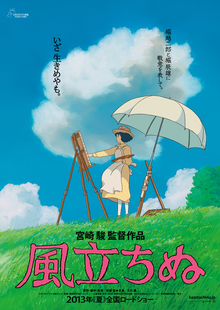| The Wind Rises | |||||
|---|---|---|---|---|---|
 Theatrical release poster | |||||
| Japanese name | |||||
| Japanese | 風立ちぬ | ||||
| Literal meaning | The Wind Has Risen | ||||
| |||||
| Directed by | Hayao Miyazaki | ||||
| Screenplay by | Hayao Miyazaki | ||||
| Based on | 風立ちぬ by Hayao Miyazaki | ||||
| Produced by | Toshio Suzuki | ||||
| Starring | |||||
| Cinematography | Atsushi Okui | ||||
| Edited by | Takeshi Seyama | ||||
| Music by | Joe Hisaishi | ||||
Production company | |||||
| Distributed by | Toho | ||||
Release date |
| ||||
Running time | 126 minutes[1] | ||||
| Country | Japan | ||||
| Language | Japanese | ||||
| Budget | US$30 million[2] | ||||
| Box office | US$136.5 million[3][4] | ||||
The Wind Rises (Japanese: 風立ちぬ, Hepburn: Kaze Tachinu, lit. 'The Wind Has Risen') is a 2013 Japanese animated historical drama film written and directed by Hayao Miyazaki, animated by Studio Ghibli for the Nippon Television Network, Dentsu, Hakuhodo DY Media Partners, Walt Disney Japan, Mitsubishi, Toho and KDDI. It was released in Japan on 20 July 2013 by Toho, and in North America by Touchstone Pictures on 21 February 2014.
Based on Miyazaki's manga of the same name, The Wind Rises portrays a fictionalised account of the life of Japanese aeronautical engineer Jiro Horikoshi, in particular his engineering career from his time at the University of Tokyo in 1923 to the first test flight of the Mitsubishi Ka-14 on 4 February 1935.[5] Juxtaposed with the historical events is a fictional romance of Horikoshi's, inspired by the similarly-named semi-autobiographical novel The Wind Has Risen by Tatsuo Hori. The film was originally intended to be Miyazaki's final feature film,[6][7] before Miyazaki reversed his decision and eventually directed The Boy and the Heron.[8][9]
The Wind Rises was the highest-grossing Japanese film in Japan in 2013. Though it caused some political controversy and criticism in Asia, it was met with critical acclaim. The film was nominated for several awards, including the Academy Award for Best Animated Feature, the Golden Globe Award for Best Foreign Language Film, and the Japan Academy Prize for Animation of the Year, winning the latter.
- ^ "THE WIND RISES (12A)". StudioCanal. British Board of Film Classification. 31 March 2014. Archived from the original on 7 April 2014. Retrieved 1 April 2014.
- ^ Robles, Manuel (2013). Antología Studio Ghibli: Volumen 2. Barcelona: Dolmen Editorial. p. 80. ISBN 978-8415296935. Archived from the original on 15 October 2018. Retrieved 21 July 2020.
- ^ "The Wind Rises (2014) – Box Office Mojo". Archived from the original on 4 April 2014.
- ^ "International Total Gross". Box Office Mojo. Archived from the original on 28 February 2014. Retrieved 3 March 2014.
- ^ Green, William; Swanborough, Gordon (August–November 1982). "The Zero Precursor...Mitsubishi's A5M". Air Enthusiast. No. 19. pp. 26–43.
- ^ "宮崎駿監督「この世は生きるに値する」 引退会見の全文" (in Japanese). The Nikkei. 7 September 2013. Archived from the original on 5 February 2016. Retrieved 11 October 2023.
- ^ Highfill, Samantha (6 September 2013). "Hayao Miyazaki on his retirement: 'This time I am quite serious'". Entertainment Weekly. Archived from the original on 21 October 2013. Retrieved 27 October 2019.
- ^ "宮崎駿監督、新作タイトルは「君たちはどう生きるか」:朝日新聞デジタル". Asahi Shimbun. 14 November 2021. Archived from the original on 14 November 2021. Retrieved 13 September 2023.
- ^ Piedra, Josh (28 October 2017). "Hayao Miyazaki's Final Film Title is How Do You Live?". The Outerhaven. Archived from the original on 21 February 2018. Retrieved 3 March 2018.